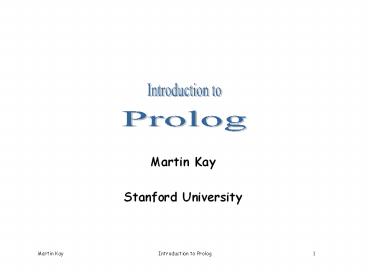Martin Kay PowerPoint PPT Presentation
Title: Martin Kay
1
Introduction to
Prolog
- Martin Kay
- Stanford University
2
Topics
- Books
- Starting and stopping Prolog
- Consulting and reconsulting files
- Assertions and queries
- Constants and variables
- Nondeterminism
- Lists
- Facts and rules
3
Books
- Bratko, I. (1986) Prolog Programming for
Artificial Intelligence. International Computer
Science Series, Addison Wesley. - Clocksin, W. F. and C. S. Mellish (1981)
Programming in Prolog. Springer-Verlag, Berlin. - König, E. and R. Seiffert (1989) Grudkurs Prolog
für Linguisten. UTB für Wissenschaft
Uni-Taschenbücher, A. Franke Verlag, Tübingen. - O'Keefe, R. (1990) The Craft of Prolog. MIT
Press, Cambridge, Massachusetts. - Ross, P. (1989) Advanced Prolog. Addison Weseley.
- Sterling, L. and E. Shapiro (1986) The Art of
Prolog. MIT Press, Cambridge, Massachusetts.
4
Sicstus Prolog
- Swedish Institute of Computer Science (SICS)
Setting the path environment variable (on Leland)
elaine27gt more .cshrc _at_() Leland Systems
.cshrc version 3.0.4 elaine27gt more .cshrc
_at_() Leland Systems .cshrc version
3.0.4 .... set path( /afs/ir/class/ling138/b
in path) ....
5
Sicstus Prolog
- Swedish Institute of Computer Science (SICS)
1 sicstus SICStus 2.1 9 Fri Oct 21 163141
PDT 1994 ?- halt. 2
6
(No Transcript)
7
(No Transcript)
8
(No Transcript)
9
(No Transcript)
10
Queries
11
Queries
Now we can make this a real link!
12
(No Transcript)
13
Consulting files
- ?- consult(maize).
- consulting /tmp_mnt/tilde/kay/pl/parsers/maize.pl
... - /tmp_mnt/tilde/kay/pl/parsers/maize.pl
consulted, 160 msec 1056 bytes - yes
- ?-
consult(maize.pl). maize. maize.pl.
14
Facts and Rules
- past(dive, dived).
- past_tense(dive, dove).
- pres_part(dive, diving).
- sing3(dive, dives).
- past_tense(write, wrote).
- past_part(write, written).
- pres_part(write, writing).
- sing3(write, writes).
- past_part(Verb, Word) -
- past(Verb, Word).
- past_tense(Verb, Word) -
- past(Verb, Word).
Head
Goal
15
The /2 operator
- ?- Xfoo.
- X foo ?
- yes
- ?- XY.
- Y X ?
- yes
- ?- foo(A, b)foo(a, B).
- A a,
- B b ?
- yes
16
Unification
- ?- p(a, Q, b) p(A, A, A).
- no
- ?- p(a, Q, R) p(A, A, A).
- A a,
- Q a,
- R a
- yes
- ?- p(q(a, a), r(X, X), s(Y, Y))p(X, Y, Z).
- X q(a,a),
- Y r(q(a,a),q(a,a)),
- Z s(r(q(a,a),q(a,a)),r(q(a,a),q(a,a))) ?
- yes
17
Ordered Pairs
?- Xa b c . Xa, b, c yes
?- Xa b. Xa b yes
18
member/2
- ?- member(b, a,b,c).
- yes
- ?- member(X, a, b, c).
- X a ?
- X b ?
- X c ?
- no
- ?- member(a, X, b, Y).
- X a ?
- Y a ?
- no
member(H, H_). member(X, _T) -
member(X, T).
19
append/3
- ?- append(a, b, c, p, q, r, X).
- X a,b,c,p,q,r ?
- yes
- ?- append(a, b, c, X, a, b, c, d, e, f).
- X d,e,f ?
- yes
- ?- append(X, d, e, f,a, b, c, d, e, f).
- X a,b,c ?
- yes
append(, A, A). append(CD, A, CB) -
append(D, A, B).
20
(Naive) reverse/2
- ?- reverse(a, b, c, X).
- X c,b,a ?
- yes
- ?- reverse(X, a, b, c).
- X c,b,a ?
- yes
- ?- Xa, b, B, A, reverse(X, X).
- A a,
- B b,
- X a,b,b,a ?
- yes
reverse(, ). reverse(HT, Rev) -
reverse(T, RT), append(RT, H, Rev).
21
Interrupting Prolog
- foo(a, b).
- C
- Prolog interruption (h for help)? a
- Execution aborted
- ?-

